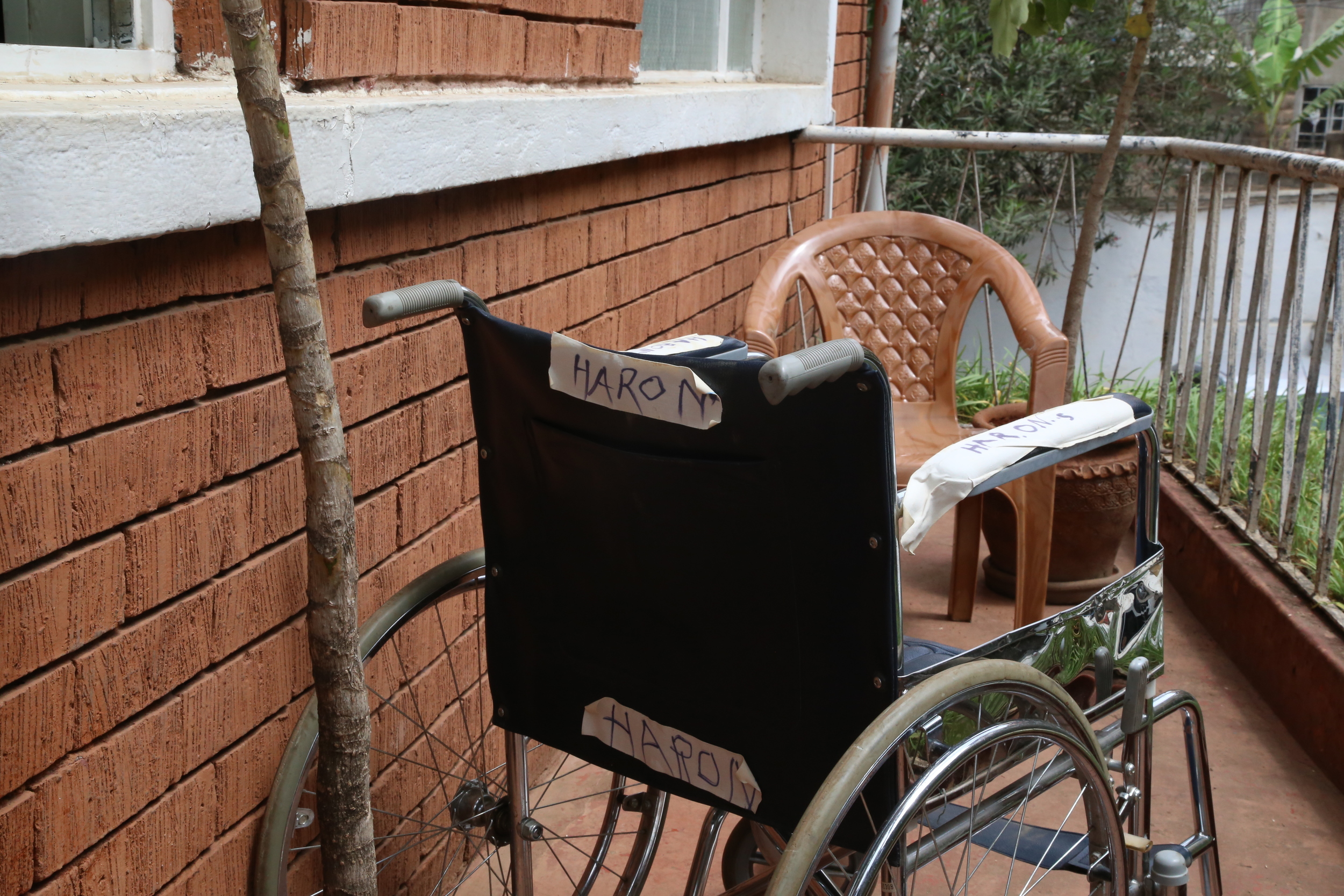Haron
by Elizabeth Mealey
What would you do if your father was ill? What if doctors treated him for arthritis, malaria, typhoid—anything but cancer—for months, referring him to one hospital, then another, running innumerable tests that always seemed to be inconclusive? What if, by the time the diagnosis arrived, heavy with the weight of finality, your father was immobile, paralyzed from the hips down because the cancer had been left to metastasize and eat away at his bones?
This is the situation that Michael faced when his father, Haron, a 73 year old man from Nakuru, Kenya, was diagnosed with B-cell lymphoma in July, 2015. At the point of diagnosis, the cancer had spread from his lymph nodes to his bones, causing spinal chord compression and partial paralysis.
Michael, a self-employed businessman, has been able to do what many Kenyans cannot: ensure that his father receives high-quality palliative care, including radio and chemotherapy, physical therapy, pain management, and counseling, at a respected private hospital in Nairobi—the Texas Cancer Centre.
Since receiving an accurate diagnosis and appropriate care, Haron’s condition significantly improved. Though bed-ridden, he is able to turn himself in bed with minimal assistance. His pain medication (a 72-hour panadol patch for around-the-clock pain management and morphine syrup for breakthrough pain) allows him to eat, hold conversations with his family, and to smile and laugh when he’s in a good mood.
In the hospital, his voice soft from fatigue but his eyes still sparkling, Haron spoke of his love of God and family, about his wife and ng’ombe back in Nakuru, his brother who had married a White woman in America, and his sons who were now devotedly overseeing his treatment. Before receiving treatment, such conversations were not possible. You couldn’t even touch him, family members said, let alone converse with him. Seeing his relief from pain has also relieved them, given them hope.
Palliative care seeks to be comprehensive, treating not just the disease but the physical, psychological, and social person as a whole. Part of this treatment involves counseling, not only for the patient, but ideally for the patient’s loved ones as well. However, for many people, talking frankly about a loved one’s illness can be just as frightening as the illness itself.
Most of Haron’s family members have played an active role in his treatment—his wife raising funds at her local church, his sons, daughters and in-laws visiting him often in the hospital and even helping to take care of him between hospital visits—but the knowledge of his diagnosis is a burden that Michael, his eldest son, has thus far borne alone. Michael is unsure how much the family actually knows about Haron’s diagnosis. He’s not even sure how much his father knows. It’s not something they discuss.
Do they know? He asked, You talked to them—how much do they know? There was something in his eyes that was hard to read—did he hope they knew, or was he desperately praying that they didn’t? He was carrying this burden for his entire family, but can the psychological pain of an entire family be spared if one member bears the brunt? Is not knowing less painful than knowing? Intense physical pain can be treated with opioid medications like panadol and morphine. Is silence the morphine of psychosocial pain?
Michael's dilemma of knowing mirrors much of what happens in Kenya. Many people in Kenya struggle to talk openly about cancer, especially when it affects members of their own family. Until recently, the curriculum at national medical schools did not include any training in palliative care, argued against the use of morphine for fear of creating addicts, and did not address how to speak openly to patients and their families about terminal diseases. Organizations such as the Kenya Hospices and Palliative Care Association and the Palliative Care Unit at Kenyatta National Hospital are working to change this, holding training workshops for medical staff and encouraging patients and their families to face difficult diagnoses openly, to support each other, and to find support in the growing palliative care and hospice centers within the country.
Haron left the Texas Cancer Centre for his son's home. He died on January 16, 2016.

![Normal
0
10 pt
0
2
false
false
false
EN-US
ZH-CN
X-NONE
$([{£¥·‘“〈《「『【〔〖〝﹙﹛﹝$(.[{£¥
!%),.:;>?]}¢¨°·ˇˉ―‖’”…‰′″›℃∶、。〃〉》」』】〕〗〞︶︺︾﹀﹄﹚﹜﹞!"%'),.:;](https://images.squarespace-cdn.com/content/v1/567af07e1115e084cc4d0ee2/1452825983040-0CT4XWOYP6YP67C5WVDC/haron05.JPG)
![Normal
0
10 pt
0
2
false
false
false
EN-US
ZH-CN
X-NONE
$([{£¥·‘“〈《「『【〔〖〝﹙﹛﹝$(.[{£¥
!%),.:;>?]}¢¨°·ˇˉ―‖’”…‰′″›℃∶、。〃〉》」』】〕〗〞︶︺︾﹀﹄﹚﹜﹞!"%'),.:;](https://images.squarespace-cdn.com/content/v1/567af07e1115e084cc4d0ee2/1452825957236-R6XSYHA85QM0BOLVOAW1/haron01.JPG)

![Normal
0
10 pt
0
2
false
false
false
EN-US
ZH-CN
X-NONE
$([{£¥·‘“〈《「『【〔〖〝﹙﹛﹝$(.[{£¥
!%),.:;>?]}¢¨°·ˇˉ―‖’”…‰′″›℃∶、。〃〉》」』】〕〗〞︶︺︾﹀﹄﹚﹜﹞!"%'),.:;](https://images.squarespace-cdn.com/content/v1/567af07e1115e084cc4d0ee2/1452825966085-IZEXRMSP4EQX94ZYXF7L/haron03.JPG)
![Normal
0
10 pt
0
2
false
false
false
EN-US
ZH-CN
X-NONE
$([{£¥·‘“〈《「『【〔〖〝﹙﹛﹝$(.[{£¥
!%),.:;>?]}¢¨°·ˇˉ―‖’”…‰′″›℃∶、。〃〉》」』】〕〗〞︶︺︾﹀﹄﹚﹜﹞!"%'),.:;](https://images.squarespace-cdn.com/content/v1/567af07e1115e084cc4d0ee2/1452825994057-JGOFFZRBDM1IG7NAILJS/haron04.JPG)

![Normal
0
10 pt
0
2
false
false
false
EN-US
ZH-CN
X-NONE
$([{£¥·‘“〈《「『【〔〖〝﹙﹛﹝$(.[{£¥
!%),.:;>?]}¢¨°·ˇˉ―‖’”…‰′″›℃∶、。〃〉》」』】〕〗〞︶︺︾﹀﹄﹚﹜﹞!"%'),.:;](https://images.squarespace-cdn.com/content/v1/567af07e1115e084cc4d0ee2/1452826068378-6OWUWX74DMVMSSNS7F4V/haron11.JPG)
![Normal
0
10 pt
0
2
false
false
false
EN-US
ZH-CN
X-NONE
$([{£¥·‘“〈《「『【〔〖〝﹙﹛﹝$(.[{£¥
!%),.:;>?]}¢¨°·ˇˉ―‖’”…‰′″›℃∶、。〃〉》」』】〕〗〞︶︺︾﹀﹄﹚﹜﹞!"%'),.:;](https://images.squarespace-cdn.com/content/v1/567af07e1115e084cc4d0ee2/1452826087169-S9JECEIWT37ZK9EJ1M6A/haron12.JPG)